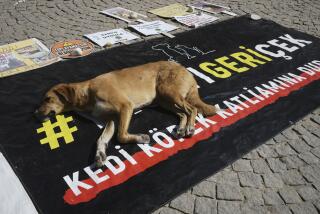Moves to Limit Alcohol Use Intensify Debate in Turkey
- Share via
ANKARA, Turkey — Efforts by this nation’s Islam-rooted government to broaden restrictions on the sale of alcohol have sparked accusations among secular lawmakers that it is seeking to strengthen the role of religion in daily life.
The debate began this year when municipalities run by the ruling Justice and Development Party, or AKP, set in motion plans to move businesses that serve alcohol to “red” zones outside city centers.
Criticism of the initiative sharpened this week after Turkish media reported that it would affect lucrative tourist resorts on Turkey’s Mediterranean and Aegean coasts. Alcohol has already been struck from the menus of many social clubs run by the AKP.
“They pose a threat not only to civil liberties but Turkey’s image and the tourism industry as well,” wrote Hasan Cemal, a columnist for the pro-establishment daily paper Milliyet.
“By even contemplating such bans and talking about red light districts for alcohol, they cater to the basest prejudices that people in Europe have about Muslim society,” a European diplomat said. Like most foreign envoys, he declined to be identified because of the issue’s sensitivity.
Turkish Prime Minister Recep Tayyip Erdogan has defended the move, saying that “as state institutions, the municipalities should not set a bad example.”
A pious Muslim who does not drink, Erdogan recently blamed drunk driving for 80% of Turkey’s traffic accidents. Police statistics quoted in the Turkish media set the figure at less than 1%.
Since taking office three years ago, the Erdogan regime has steadily raised taxes on alcohol. Industry sources say taxes on beer have risen a whopping 450%, more than three times the average of the countries in the European Union, the steadfastly secular alliance that Turkey hopes to join. EU officials have been concerned about Turkey’s suitability for membership because of the ruling party’s religious background.
Suspicions that the increases were meant to discourage drinking deepened this year, when Finance Minister Kemal Unakitan told a Turkish newspaper: “We can hardly tell them not to drink, so we discourage citizens by raising taxes.”
Such comments demonstrate that “this government has not abandoned its Islamist reflexes,” said opposition lawmaker Emin Sirin.
“Their claims that that is a health and safety issue are completely false,” he added during a telephone interview. “If they were serious, they would start with a campaign against smoking, which is a far greater health hazard in Turkey.”
Under the secular system introduced by the country’s founder, Kemal Ataturk, in 1923, Turkey has evolved into one of the most Westernized nations in the Islamic world. In keeping with the legacy of Ataturk, who downed liberal amounts of raki, the aniseed-flavored national drink, freedom to drink alcohol is embedded in the Turkish vision of a modern society.
Although alcohol is shunned in the conservative rural heartland, Erdogan has said the state has no plans for an outright ban. He has accused the opposition of deliberately misrepresenting the government’s aims.
Many analysts acknowledge that there is little proof that Erdogan still believes in mixing religion and politics. Rather, he is widely credited with ramming through a blizzard of reforms that helped Turkey gain the opportunity to begin EU membership talks on Oct. 3.
So far, the government has “not overstepped the boundaries of the secular system,” said Suat Kiniklioglu, who focuses on Turkey for the German Marshall Fund, a U.S.-based think tank.
Such caution stems in part from the government’s fear of provoking the country’s rigidly pro-secular generals.
The military, Turkey’s most trusted institution, has seized power three times in the last four decades. In 1997 it forced the country’s first Islamist-led government out of office on accusations that it was seeking to introduce religious rule.
Erdogan, who was elected mayor of Turkey’s largest city, Istanbul, was forced out of office a year later and spent four months in jail on charges of inciting religious hatred with a well-known nationalist poem he recited at a rally. The experience is said to have dramatically altered Erdogan’s approach to politics.
Analysts liken the curbs on drinking to Erdogan’s previous efforts to outlaw adultery, seen as meant to appease pious constituents who were disgruntled by his failure to ease the ban on the Islamic head scarf for girls at state institutions and schools.
The government’s hand was further weakened last month, when the Strasbourg, France-based European Court of Human Rights ruled in favor of the head scarf ban at Turkish universities. Erdogan lashed out at the court, saying it should have consulted Islamic jurists before passing its judgment. His stance provoked a fresh round of criticism from secularists.
More to Read
Sign up for Essential California
The most important California stories and recommendations in your inbox every morning.
You may occasionally receive promotional content from the Los Angeles Times.










